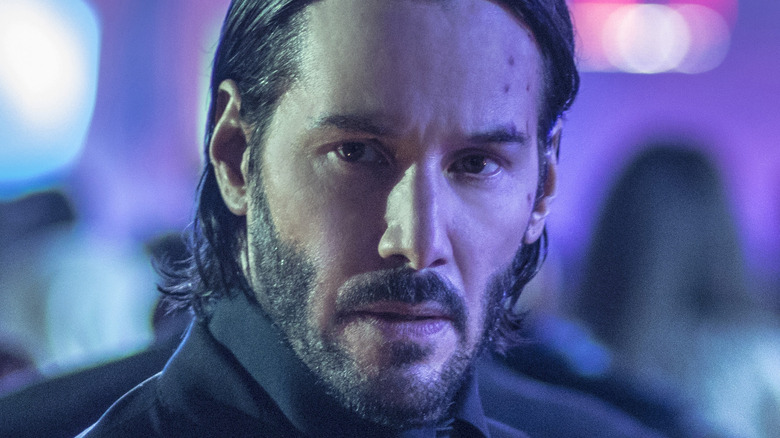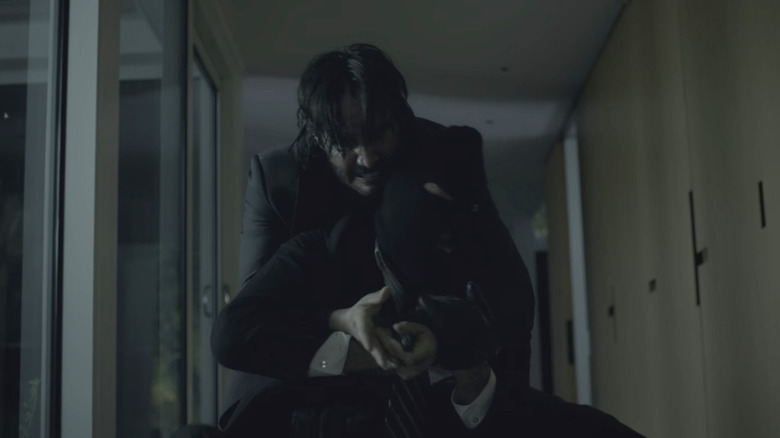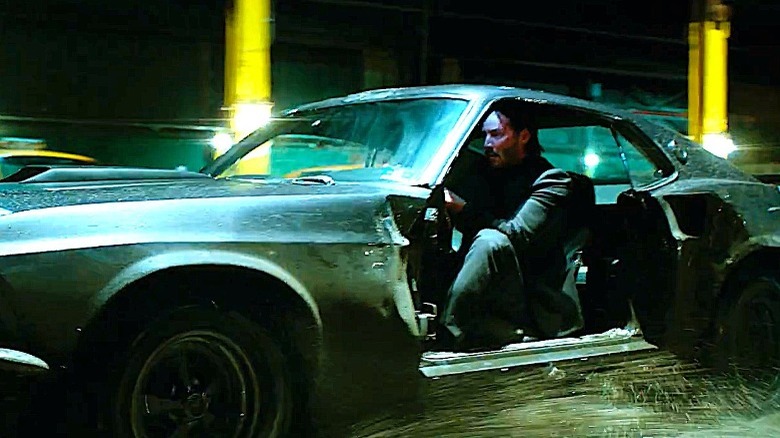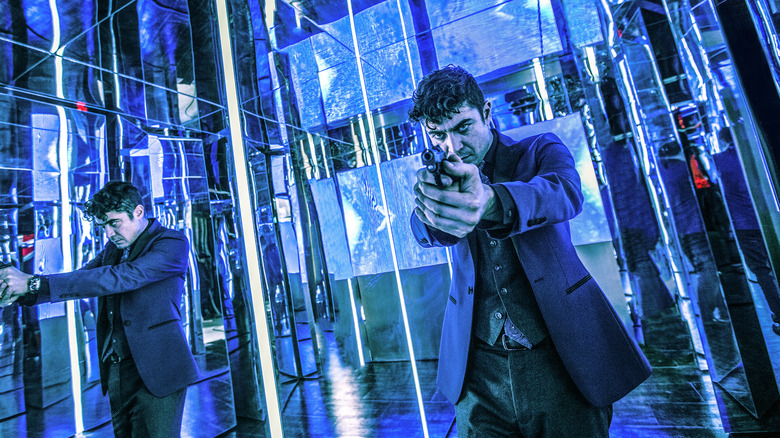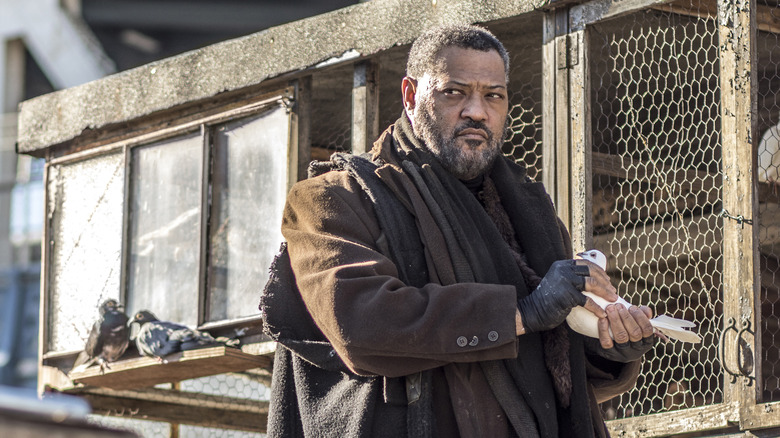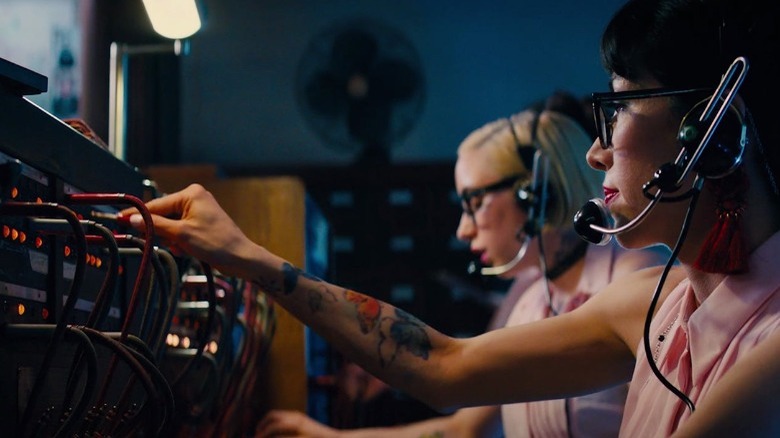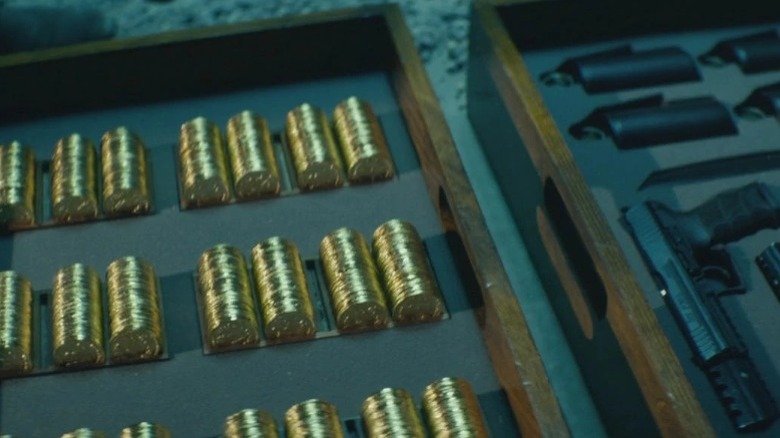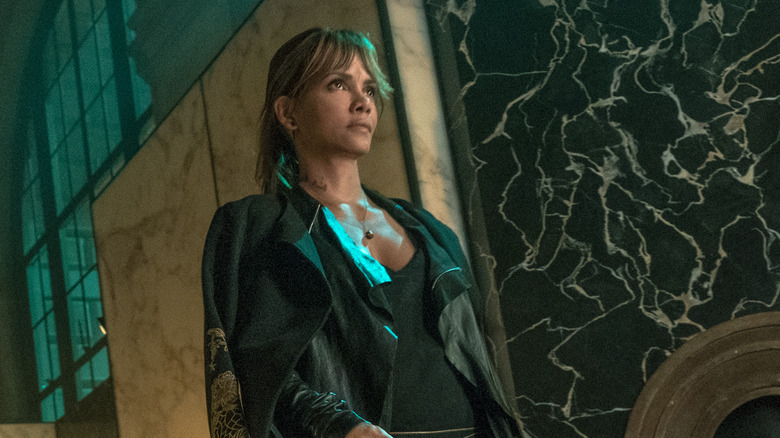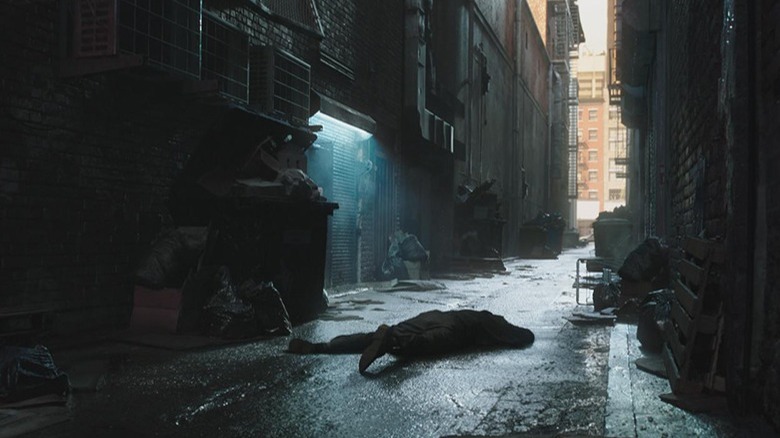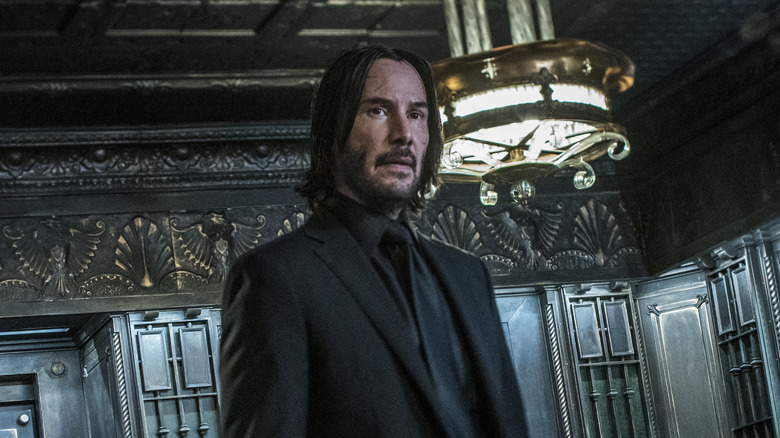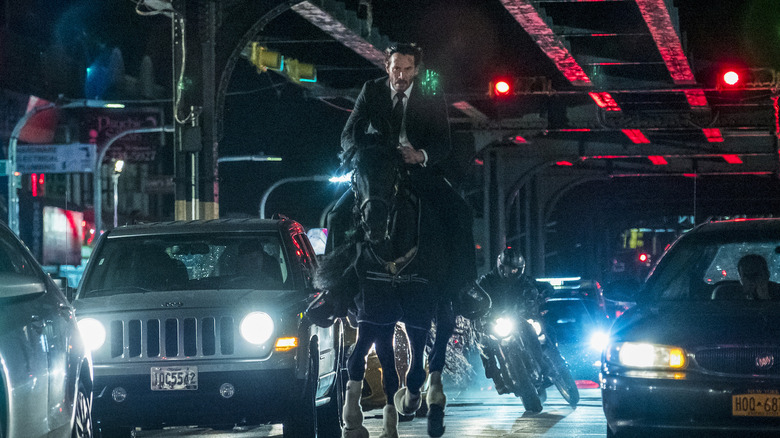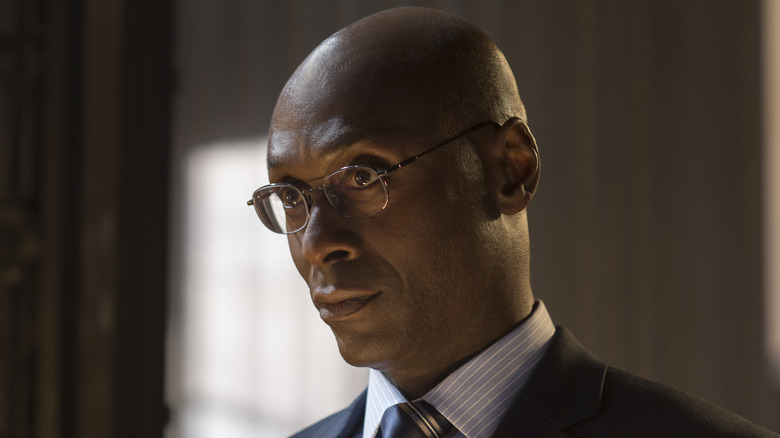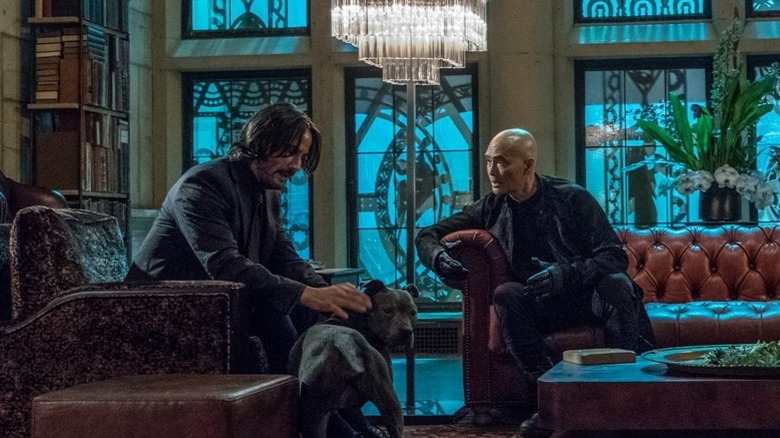The Biggest Plot Holes In The John Wick Franchise
There's nothing that says love louder than the affections of a fresh-faced puppy. And there's no greater fury that could possibly be stoked than the murder of such a cute, furry innocence. John Wick (Keanu Reeves) is a tortured soul, one who's lived a life of bloodshed but who ultimately found peace – at least for a time. The cold, hard reality of life swooped in and claimed his wife, Helen (Bridget Moynahan). Though, she had enough foresight to give her grieving husband the gift of purpose in the form of a bright-eyed beagle. When greedy Russian mobsters tail John home one fateful day to take his prized vintage 1969 Ford Mustang Mach 1, they assault John and kill his puppy. But they made one crucial mistake — leaving John alive.
Thus, the Baba Yaga is reborn. This time, he's far scarier than he likely ever was as a casual contract killer. Now, he is driven by a fire in his belly that swells each time he reflects on the loss he suffered. He's not back for money or fortune. He's back for vengeance. And even after John kills the man who besmirched the memory of Helen, he continues to fight just so he can live to retain his memories of her.
After a trilogy of movies (and more to come), John Wick has dazzled audiences with visceral action and brutality unfolding on screen to the backdrop of a neo-noir landscape. The filmmakers have created an underworld of assassins, a global collective that is ultimately governed by a shadowy organization known as the High Table. While these films are thrilling, they often leave viewers questioning the rules the narrative has established. Let's examine some of the more glaring plot holes at play in the "John Wick" franchise.
The noise complaint
Iosef Tarasov (Alfie Allen), the son of a notorious Russian kingpin named Viggo (Michael Nyqvist), is the man, or petulant child rather, who signed his own death warrant the day he stole from John Wick and killed his dog. As his father so eloquently put it, John will come for him and there's nothing he can do about it. Of course, Viggo attempts to reason with the stoic killer over a quick phone call. John hangs up the phone in silence. Shaken to his core knowing what John is capable of, Viggo sends his own task force to John's residence in hopes that they can snuff out the flame before it turns into an out-of-control wildfire. John's no dummy, however. He knows Viggo will attempt to make the first move. So, he's ready for the mercenaries the moment they enter his home.
As a first introduction to John's combat prowess on screen, he certainly puts on a heck of a show. After making short work of the first few men to enter his home, John continues to silently move through the house and catch the next group of bad guys by surprise. While this sequence is spectacular in its execution, there's one questionable aspect of the entire affair. Just after John eviscerates 12 men, a police officer who John knows personally as Jimmy (Thomas Sadoski) shows up at the door because of a noise complaint. The idea that enough noise was created during the scuffle to warrant a complaint adds some confusion as to why some of the men throughout the house couldn't pinpoint John's location. He still managed to take each of them by surprise despite the sound of his slayings reverberating through the neighborhood.
Viggo's brother taking John's car
The second film begins with Viggo's brother, Abram (Peter Stormare) reintroducing the titular character to the masses. He explains to his underling that he has John's car in his possession. After which, he regurgitates the line Viggo fed his son regarding John's nature. Simply put, he's a man of focus and sheer will. He once killed three men in a bar with a pencil, and so on and so forth. Abram is clearly fearful of John, and rightly so. He practically loses every man in his warehouse to John's righteous anger over holding his car.
So, the question becomes: why would Abram keep John's car given what he knows and clearly fears? In the first film, Aurelio (John Leguizamo) refused to take John's car into his shop when Iosef brought it to him knowing the world of hurt it'd bring him. So why wouldn't Abram do the same? He never gives a good reason despite knowing John could potentially kill him for it. He did, however, live to see another day, but he lost a lot of manpower in the process, and for what? A car?
Killing a member of the High Table
This plot hole is the result of further unraveling the mysteries of the assassin underworld despite conflicts with previous plot points. There's a moment in "John Wick: Chapter 3 Parabellum" that creates a plot hole for its predecessor "John Wick: Chapter 2." The sequel film picks up after John attempts to go back to the life he once enjoyed after laying waste to Viggo and his entire operation. But a former associate, Santino D'Antonio (Riccardo Scamarcio), approaches John knowing he's back in the game. He claims John owes him due to a blood oath he took in his previous life as a hitman. Santino did John a favor, and now John is bound to return in kind. The job? Santino wants John to kill his sister, Gianna (Claudia Gerini). She has a seat at the High Table, the governing body of the assassins. Santino wants to create a vacant seat for him to slide right into.
So, John finds Gianna. While he intended to kill her and fulfill his task, she did the deed herself realizing John was bound by the marker. In the third film, the Adjudicator (Asia Kate Dillon) punishes the Bowery King (Laurence Fishburne) for supplying John with weaponry he knew was intended to kill the newly-crowned High Table member, Santino. So if gunning for a High Table member is off-limits, wouldn't this directly conflict with Santino's bid to kill his sister? Wouldn't she have been able to nullify John's marker with her authority and have the High Table retaliate against Santino for his aim to kill a High Table member?
There are far too many assassins in the John Wick world
In the first film, John Wick is a legend. While the Continental houses other mercenaries, hitmen, and hitwomen who deal in the business of death, there's still a mystery and rarity to the members of this world. Of course, John is, perhaps, the most legendary of the bunch. Even a cunning assassin such as Zero (Mark Dacascos) is starstruck at the chance to fight and hopefully defeat John Wick. However, the second and third films build on the world the first film started and demonstrate just how expansive and far-reaching the players in this shifty world of assassins go.
Once John is deemed excommunicado by Winston (Ian McShane) for conducting business on Continental grounds, a bounty is placed on his head. It feels like nearly everyone he passes in the streets is receiving the call and gunning for him. Contract killers are hiding in plain sight everywhere disguised as chefs, ordinary pedestrians, and even homeless vagrants. Of course, this moment ramps up the intensity of the ticking clock on John's life, but it makes us wonder how a secretive world so densely populated can remain, well, a secret from the general public. While it doesn't necessarily contradict any specific rules laid out by the plot, it's remarkably unbelievable, even for a fictional world as established by the first "John Wick."
The operators use outdated technology
This Illuminati-esque society of secretive leaders and operators has its finger on the pulse. Word gets around fast among those connected and subservient to the High Table. Once the enigmatic leadership deems the Continental deconsecrated, mercenaries enter the Hotel with the most sophisticated equipment. The strange order that John and the rest of the assassins fall under sees its participants often employ state-of-the-art tactics as they claim contracts for hire.
Later, once John becomes the central target of the entire assassin underworld, Winston sends out a message to all killers in the contract killer phone book so-to-speak that there's a bounty on John's head. It's here that we get to see some of the behind-the-scenes operations of this organized world. After all, they may be ruthless killers, but the organization is a result of rules that exist, as Winston would say, that "separates us from the animals." We see that there are operators that run a switchboard for contracts available to assassins under the High Table. Stylistically, the women appear to be pin-up models ripped right out of the '40s or '50s. They even operate seemingly outdated technology like the analog switchboard at their fingertips. Clearly, this is an aesthetic choice, one that is pretty cool given the imagery and time period it evokes in a modern neo-noir setting. However, the outdated tech clashes with the idea that this organization is ahead of the curve and answers to no provincial or government leaders as it carries out its bidding in the shadows.
What are the gold coins worth?
As John unearths his weapons and stashed funds, we learn quickly that he only deals in gold coins with those associated with the world of assassins. In the first film, he pays off the cleaners who take care of the 12 dead bodies at his home with gold coins. What becomes hard to discern, however, is how much each of these gold coins is worth. Clearly, they must carry a specific value, but John uses them frequently for services of varying values. He offers a single gold coin at the bar for a drink. But apparently, a solitary gold coin is also worth a one-night stay at The Continental.
Additionally, it becomes unclear who takes John's form of currency. Clearly, The Continental and all the assassins deal in gold coins. However, John is even seen paying the cabbie with a gold coin — which is, again apparently equivalent to an alcoholic beverage or a one-night stay at the hotel. There's a lot of ambiguity regarding John's use of gold coins. Of course, they're not exactly crucial to the plot. But as a detail, there are glaring issues with how they're being handled.
The Moroccan Continental avoids punishment
"John Wick: Chapter 3 Parabellum" depicts the titular character in a world of hurt from the get-go. The film picks up right after its predecessor's finale with John on the run and a ticking clock on his status with The Continental as excommunicado. The moment John has become blacklisted, he loses nearly all of his friends. This is because anyone who is seen assisting the hitman is subject to penalty or punishment. This is made clear when he goes to see his favored doctor (Randall Duk Kim) to help him dress and stitch a wound at the eleventh hour. While the good doctor helps him most of the way, he has to stop once John's time is up so that he's not punished by the High Table. John recognizes this and finishes the patchwork himself.
Later, the Bowery King is punished for indirectly aiding John in assassinating Santino. Winston is also subject to punishment and abdication of his leadership over The Continental for merely giving John Wick an hour head start before he sent the dogs after him. Later, we see the Director (Anjelica Huston), head of the Ruska Roma crime syndicate also suffer punishment for providing John safe passage to Casablanca. During his stay in Casablanca, John meets up with Sofia (Halle Berry) the current manager of the Moroccan Continental. Due to their history together and the fact John has a marker from Sofia (which is meaningless now), he is able to convince her to assist him, although begrudgingly. Despite this, she is never noted by the Adjudicator as being subjected to a penalty like everyone else who assisted John along the way. What makes the Moroccan Continental so special?
Surviving the fall at the end of the third film
Alright, let's talk about that fall, shall we? At the end of the third film, Winston seemingly betrays his friendship with John Wick and heeds the Adjudicator's call to execute John. Winston shoots John and the legendary assassin falls off the roof of The Continental. Granted, he did hit another roof halfway down and then managed to ricochet off a fire escape stairway on the opposite building to slow his fall a bit.
But let's dissect this scene. Sure, John is wearing a bulletproof suit. But that will only do so much. He takes five rounds from Winston's 9mm handgun at point-blank range. It can be argued that Winston was likely aiming for John's bulletproof suit not intending to actually kill his friend but to put on a show for the Adjudicator. After all, it's hard to believe Winston truly turned on John after all they've been through. When John bails over the ledge, he falls at least two stories onto a slanted roof. He rolls off that and tumbles at least another three stories into the fire escape which most assuredly broke some bones upon impact. He then tumbles down another two stories hitting the pavement with a hard thud. It's a brutal fall and is one that John would at a bare minimum be severely bleeding internally from given the impact. But, he is the Baba Yaga after all.
Owning a bulletproof suit with magical abilities
John is man of action. He's seemingly always prepared. And, of course, he always wins the day. Let's be honest, he has the best plot armor around. With his name in the franchise title, how could he not? So, nothing really ever feels like a question as to whether John Wick will make it out of this sticky situation alive or not. We know he's going to. The fun of these films is finding out how he manages to survive — you know, by killing a couple of assassins with a pencil.
In the first film, we see that John has no financial worries. His days as an assassin were very lucrative. He owns a nice home and a beautiful vintage hot rod, and he has a stash of gold to boot. His firearms also can't come cheap. But there's one odd vacancy in his collection of battle gear: a bulletproof suit. In "Chapter 2," he's given a bulletproof suit from the armory at the Rome Continental. But he never owned one himself despite other high-profile assassins also having them on the job which seems odd.
The other question is how such a suit can withstand gunfire at point-blank range. John has taken a few bullets by the time "Parabellum" wraps up, some of which were Winston's three-feet-away shots pumped directly into the leading man's chest. Yet the suit seems undamaged, and John is no worse for wear when it comes to the shots fired at him. That's some real magic that even our own police force and military would be envious of.
John's wounds never slow him down
As we've said once, John has the thickest plot armor of most modern action stars. There's no stopping him and nor should we expect anyone to do so. Despite all of this, he is still human. As an ordinary human, he takes a great deal of punishment for his labors. Keep in mind that "Chapter 2" occurs mere days after the first film. "Chapter 3" literally picks up at the moment "Chapter 2" ends. The entire trilogy seemingly takes place in the span of mere days.
Now, add up all the injuries John suffered in three films and figure out how the man has even had time to heal from being stabbed in the abdomen by Viggo in the first film, let alone all the other beatings, stabbings, and gunshot wounds the man suffers throughout the remainder of the trilogy. And let's not forget, as we've previously discussed, the fall he endures off the side of The Continental as the cherry on top. At this stage, we might as well consider John Wick to have a certain kinship with Michael Myers. Nothing, it seems will stop the man aside from potentially being crowd-surfed into a meat grinder. "Halloween Ends" jokes aside, John Wick is no mere mortal at the end of the day. The films may try to make us think he's only human by having him struggle to find a doctor while on the run, but we know better. He'll keep on trucking to see another day and stab some other poor sap's eye out.
Charon's armor-piercing rounds
In the final act of the third film, John and Winston decide to go to war with the High Table as Winston refuses to step down and John declines to kill Winston as ordered. Charon (Lance Reddick) and his security team are, of course, loyal to Winston and are outfitted with all the weaponry Charon's armory can muster. With the hotel now deconsecrated, business can be conducted on The Continental grounds. The High Table sends in their most elite killers outfitted head to toe with body armor. As John, Charon, and The Continental security detail head into the fray, they find that the body armor of the elite is making things rather difficult. Charon's security detail is cut down swiftly leaving John and Charon left to do the dirty work. Both John and Charon head back to the armory, and Charon equips them both with armor-piercing slugs for their tactical shotguns.
This begs the question: why didn't they enter the fight with armor-piercing weaponry to begin with? They literally acknowledged that this was war. Of course, the High Table is going to pull out all the stops. John's plea for "more firepower" seems like a lack of foresight. Charon should've equipped all of his subordinates with armor-piercing rounds from the get-go. Now they're just casualties in John and Winston's dust-up with the High Table. Given John and Charon's careful judgment and penchant for preparedness, it's a bit out of character to find out they're lacking the tools they need to do the job.
John invokes safe haven rules when he's excommunicado
Zero is chomping at the bit to secure himself a piece of glory by being the one to take out John Wick. He presents himself as a bit of a fanboy of John's work. But, like a true sociopath, he takes pleasure in executing the will of the High Table — literally. He kills countless men including the Bowery King's most faithful as well as many within the Ruska Roma Crime Syndicate all to send a message from the High Table that insolence won't be tolerated.
At one point in the film, he pursues John on a motorcycle. The two crash in front of the steps of The Continental. Zero gets up and is ready to put a bullet in John as John lays his hand on the steps of the hotel. Charon appears, stopping Zero by telling him to put his weapon down or risk becoming excommunicado. Zero even states, "he's excommunicado," noting that John shouldn't be safe anywhere. Charon still insists that what he says should overrule the standing of the High Table on the matter — without really backing that up with any proof. Inexplicably, Zero gives in and puts his weapon down when he actually had John by all rights and rules laid forth by the High Table. It's hard to belive Zero would give in so easily knowing how persistently he pursues John Wick, knowing how knowledgeable he seems to be of the High Table's rules.
